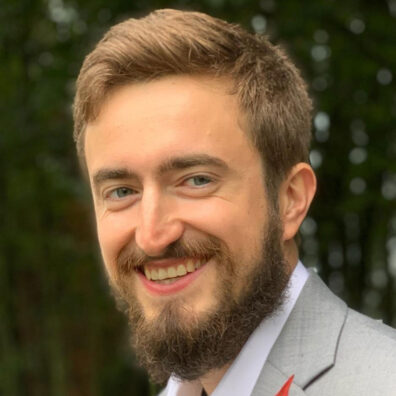
After Maritime Career, Sean Russell Returns to WSU
By Becky Kramer

Russell initially followed that path. He briefly attended Washington State University before spending most of his 20s working on tugboats in Puget Sound. Then a work accident left Russell with permanent damage to his right wrist. After three surgeries, he decided it was time to return to school.
Russell, 32, will graduate from WSU Vancouver in December with a business administration degree. He’s majoring in management information systems.
“I had a bit of a history with WSU, so it feels like a redemption arc,” he says of his upcoming graduation. “WSU was where I started as an 18-year-old and dropped out after one semester.”
He recently reflected on his experience as a non-traditional college student and the satisfaction of tackling new challenges.
When I first attended WSU, I didn’t know what I wanted to do. I needed to do some exploring and get some life experience.
Part of my family is in the commercial fishing industry, so I spent summers in Alaska. After working at other jobs, I got hired as a deckhand cook. I worked my way into a maritime program and eventually got my mate’s license. I ended up working for Foss Maritime in Seattle.
When I was I hurt on the job, I had a life crisis. My doctor said, “You might not be able to work with your hands anymore.” I realized I didn’t have any skills other than this trade, and I needed a degree.
I earned an associate’s degree at Shoreline Community College and enrolled at the University of Washington just before the pandemic hit. I attended for a year, but took time off to work in my family’s charter fishing business, which was having a hard time finding licensed captains because of COVID-19.
That prompted me to look at the tug industry again. I spent six months at Shaver Transportation moving grain on the Columbia River. When business slowed down, I was laid off. After working in that environment again, I remembered how hard it was on my body. Not just the physical work, but the lack of sleep. You’re in a floating, shaking, noisy can, so it’s hard to get rest.

It was time to go back to school. WSU Vancouver was close and convenient.
I didn’t know where I wanted to go with my business administration degree, but this time around, I used the indecision to my advantage. I tried out different classes to narrow down my interests. I’ve always been curious about technology, and I settled on my major after an introductory class in informatics.
Avery Smith teaches the management information systems classes at WSU Vancouver. He frequently gives examples from his time in industry. I like that practical connection to business.
This past summer, I did an internship in product ownership at the Seattle office of West Monroe, a business and digital consulting firm.
Maritime work and product ownership both require you to be a jack of all trades. On any given day on a tug, I could be cooking, cleaning, driving the boat, throwing lines, working with electrical components, or doing engine maintenance. As a product owner, you could be planning software strategy, reviewing code, analyzing data, communicating with stakeholders, or conducting focus groups with end users.
At WSU Vancouver, I’ve also had the opportunity to serve on the Carson College of Business Advisory Board as a student representative. That’s allowed me to meet business leaders from Portland and Vancouver and network with people established in their careers.
I’ve felt supported as a student returning to college. My professors and other students value my work experience, and I’ve found opportunities to inject my own interests into projects and classes. At one point, I was really interested in kelp farming for its environmental benefits. I probably wrote a half dozen papers for different classes on various aspects of kelp cultivation.
One of the biggest adjustments in coming back to school was the mental fatigue from a full day of classes. It’s equal or greater to the fatigue I felt working on a boat all day.
I would love for others to hear my story. I’m trying to get my 29-year-old brother to go back to school. School is a lot easier than some folks think. Obviously, it’s academically rigorous, but being the oldest person in your class is not as challenging as you’d imagine.
There are days I miss the water. I’ll be driving to school on a sunny day, and I’ll think, “I’d rather be out on a boat.” Other days, I’m like, “Wow, I’m glad I’m going to class today instead of being out on a barge.”